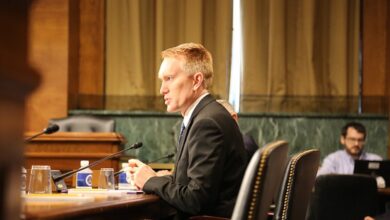3M agrees to $12.5 billion settlement over ‘forever chemicals’ in drinking water

Chemical manufacturer 3M has agreed to major concessions in a revised settlement proposal with several public drinking water systems across the U.S. The new settlement terms include paying billions of dollars more than had been previously agreed.
Per- and poly-fluoroalkyl substances (PFAS), which are manmade and invisible, are known for being resistant to grease, oil, water, and heat. The agreement concerns these “forever chemicals” which don’t break down easily in the body or in nature.
A group of 22 attorneys general had problems with the previous deal that 3M agreed to in June because it had a clause that could have made taxpayers responsible for future damages.
According to the New York State Department of Health, PFAS have been found in almost 40% of public drinking water sources in New York State. The state has spent tens of millions of dollars to clean up PFAS.
In a filing made on August 28 with a U.S. District Court, the company has agreed to a number of important changes to its previous settlement agreement, including raising the total payout from $10.5 billion to a maximum of $12.5 billion.
The amount of money that 3M has agreed to pay to settle lawsuits has increased because the company agreed to get rid of rules that forced public water systems to give up their legal claims against 3M without knowing how much money they could get in settlement, according to the New York Attorney General’s office, which was involved in the lawsuit along with over 20 other states.
“Critically, the settlement had parts that would have forced water providers to take on future liability,” the New York Attorney General’s office said in a statement. “This could have meant that taxpayers would have had to pay for damages caused by 3M’s pollution.”
When the uncapped indemnity for 3M is taken away, the deal is worth a lot more to water systems. They have 90 days to look over the terms and decide if they want to opt-out.
Also, claims by states and the federal government have been taken out of the new settlement deal. This makes it possible for more lawsuits and settlements to be taken against 3M in the future.
Under the terms of the new deal, 3M does not admit to doing anything wrong or being responsible.3M continues to deny any violation, wrongdoing, or liability with regard to any and all Claims asserted or that could be asserted in the Litigation, either on its part or on the part of any of the Released Parties, and continues to specifically deny and dispute the scientific, medical, factual, and other bases used to support those Claims. However, it has decided to sign this Settlement Agreement in order to, among other things:
Company chairman and CEO, Mike Roman, said that the company would stop making PFAS by the end of 2025. He called the agreement “an important step forward.”
Letitia James, the attorney general of New York, said that she and the other 20 or so attorneys general have decided to drop their objections to the deal with 3M now that the settlement has been changed.
“Corporate polluters like 3M shouldn’t be able to avoid taking responsibility for putting toxic “forever chemicals” into our water, which have caused terrible health problems,” James said. “This new agreement will make sure that 3M is held accountable, and I will continue to use all the power of my office to fight for New Yorkers’ right to clean drinking water.”
Other lawsuits
3M is still being sued for PFAS contamination in tens of thousands of cases that were not part of the current settlement. People who have been hurt or whose property has been damaged are among the people who have filed lawsuits. Some states have also filed cases, claiming that rivers and lakes have been hurt.
This month, Chemours Co., DuPont de Nemours Inc., and Corteva Inc. said they had reached an agreement in principle for about $1.18 billion to settle claims from about 300 drinking water providers that the companies had polluted many public drinking water systems in the U.S. with PFAS.
Missouri did not join the lawsuits, though it has three 3M plants. More concerningly, upstream states of Iowa, Minnesota and Wisconsin sued because “forever chemicals” were released into the Mississippi River. Millions of Missourians receive their drinking water from the river.
–Dwight Widaman | Metro Voice






